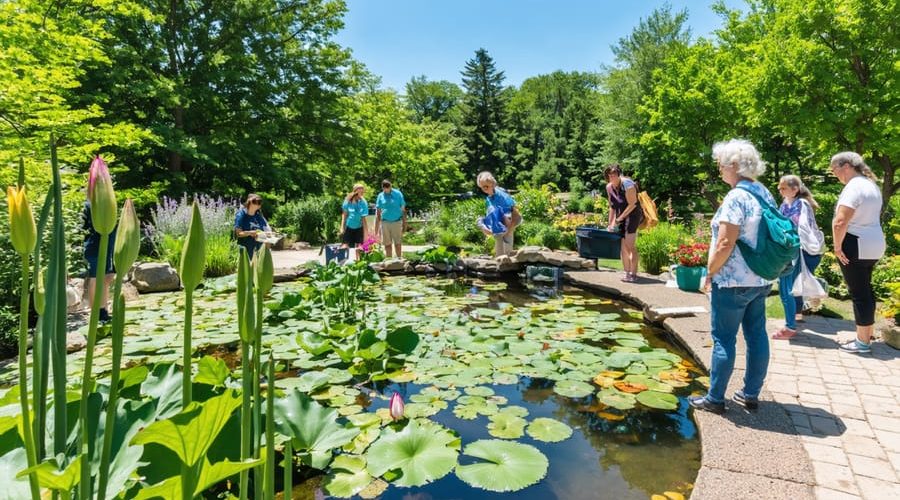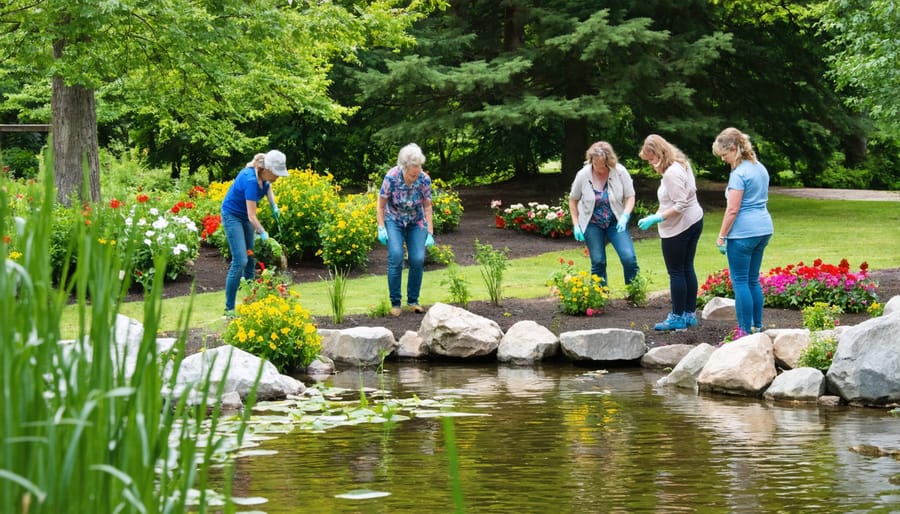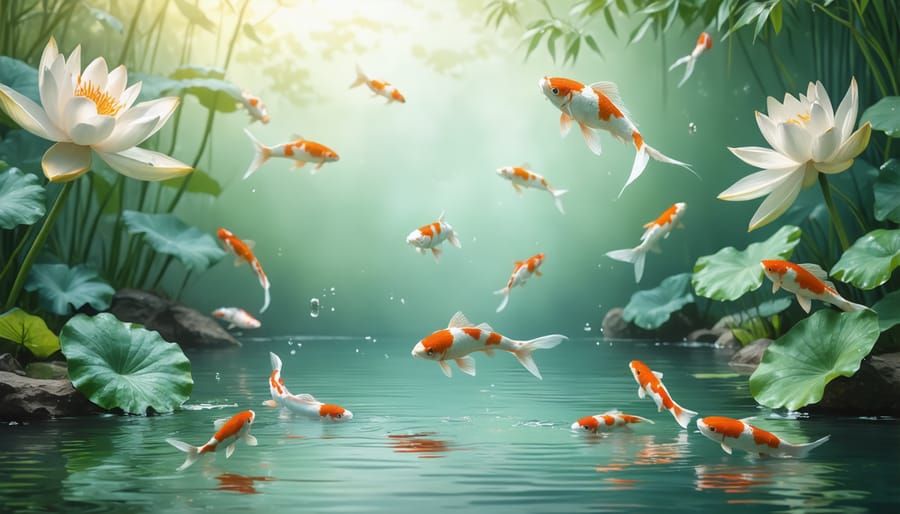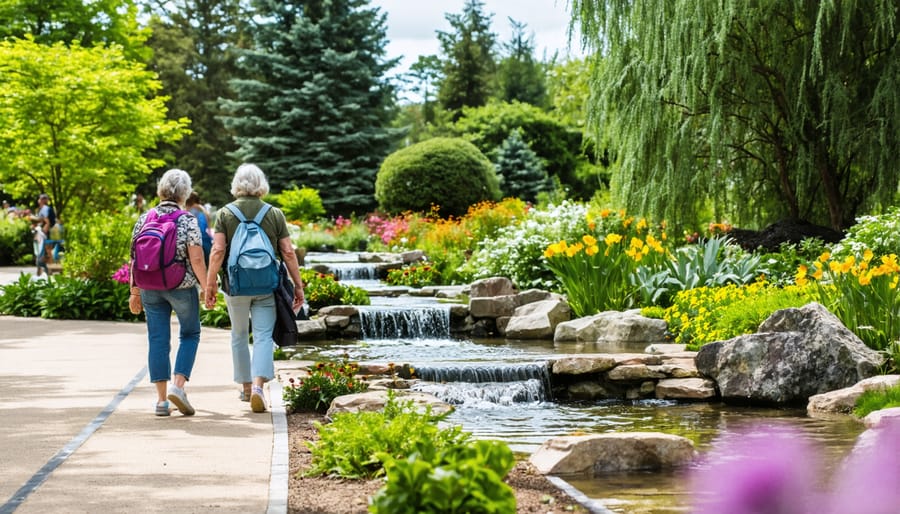
Make Your Water Garden Club Meetings Splash with These Fresh Ideas
Transform your garden club meetings into dynamic learning experiences by blending hands-on activities with educational workshops that keep members engaged and excited. From seasonal planting demonstrations to expert-led discussions on water feature maintenance, thoughtfully planned meetings create opportunities for knowledge sharing and community building among garden enthusiasts. Whether you’re organizing monthly gatherings for seasoned horticulturists or welcoming newcomers to the world of water gardening, the right mix of interactive elements and structured learning sessions ensures every meeting delivers value and inspiration. This guide explores creative meeting ideas that combine practical skills development, social connection, and the shared joy of nurturing beautiful garden spaces.
Think beyond traditional presentations by incorporating seasonal workshops, plant exchanges, and collaborative projects that showcase members’ expertise while fostering a supportive learning environment. Each meeting becomes an opportunity to explore new techniques, share successful growing strategies, and build lasting connections within your gardening community.
Planning Seasonal Water Garden Demonstrations
Spring Planting Workshops
Spring workshops are the perfect opportunity to dive into aquatic plant selection and master expert water gardening skills. Start by organizing a series of hands-on demonstrations that showcase different aquatic plant varieties suitable for various water depths and conditions.
Begin with a show-and-tell session featuring common water plants like water lilies, lotus, and marginal plants. Have experienced members demonstrate proper planting techniques using aquatic baskets and specialized pond soil. This hands-on approach allows participants to feel the correct soil density and learn about root preparation.
Create interactive stations where members can practice dividing water lilies, transplanting bog plants, and arranging floating vegetation. Consider setting up small demo ponds or containers to illustrate different planting depths and combinations. This practical experience is invaluable for beginners and helps seasoned gardeners refine their techniques.
Don’t forget to address seasonal considerations and maintenance tips. Include demonstrations of spring preparation, such as fertilizing established plants and introducing new varieties. Encourage members to share their success stories and lessons learned, creating a supportive learning environment.
End the workshop with a plant exchange where members can swap extras from their ponds, fostering community spirit while expanding everyone’s collection. This combination of education and social interaction makes spring planting workshops a highlight of the garden club calendar.

Summer Maintenance Sessions
Keep your garden club meetings engaging during the warmer months with interactive summer water garden activities focused on maintenance and water quality. Start by organizing hands-on workshops where members can learn to test water parameters using simple test kits. Make it fun by dividing into small groups and creating friendly competition for who can most accurately measure pH and nutrient levels.
Plan sessions dedicated to natural algae control methods, where members can share their experiences and success stories. Include demonstrations of beneficial aquatic plants that help maintain water clarity and demonstrate proper installation techniques. Consider inviting local experts to discuss eco-friendly treatments and preventive measures that won’t harm fish or plants.
Set up practical demonstrations for cleaning filters and maintaining pumps, ensuring everyone gets hands-on experience. Create a maintenance calendar template that members can personalize for their water features, highlighting seasonal tasks and important reminders. Don’t forget to include troubleshooting sessions where members can bring photos or descriptions of their water quality challenges for group problem-solving.
End each session with a social period where members can exchange tips and tricks while enjoying refreshments. Consider creating a digital resource library where members can access recorded demonstrations and maintenance guides for future reference. These interactive sessions not only educate but also strengthen community bonds through shared learning experiences.
Interactive Learning Activities
Water Garden Design Challenges
Divide your club members into small teams and challenge them to design their dream water garden! Start by providing each team with large sheets of paper, markers, and a set of common water garden elements cut from magazines or printed from the internet. These elements should include various pond shapes, waterfalls, aquatic plants, and fish species.
Present each team with a different design challenge to solve. For example, one team might work on a shade garden design, while another tackles a small space solution. Other challenges could include creating wildlife-friendly ponds, low-maintenance designs, or budget-conscious water features.
Give teams 30 minutes to create their design, considering factors like:
– Water depth requirements
– Plant zones and placement
– Filtration systems
– Safety features
– Maintenance access points
– Cost considerations
After the design phase, each team presents their solution to the group, explaining their choices and how they addressed their specific challenge. This sparks valuable discussions about different approaches to water garden design and common problems faced by pond owners.
Make it more interactive by having teams swap challenges halfway through or introducing surprise elements like “budget cuts” or “space limitations” that force teams to adapt their designs. End the session with a group discussion about the most creative solutions and practical tips shared during the activity.
To reinforce learning, compile the best ideas and solutions into a club resource guide that members can reference when working on their own water gardens.

Fish Selection and Care Workshops
A fish selection and care workshop offers club members invaluable hands-on experience with pond fish varieties and their specific needs. Start the session by introducing common pond fish species like koi, goldfish, and mosquito fish, discussing their unique characteristics and compatibility with different pond sizes.
Create interactive stations where members can learn to assess fish health through visual inspection. Demonstrate how to spot common issues like parasites, fungal infections, or stress behaviors. Include practical exercises on water quality testing, as maintaining proper parameters is crucial for fish health.
Organize small group activities where members practice proper feeding techniques and learn about seasonal dietary requirements. Set up a demonstration area showing different types of fish food and feeding schedules throughout the year. Include tips for preventing overfeeding and managing food storage.
Consider inviting a local aquatics expert or experienced pond keeper to share insights on quarantine procedures for new fish and basic veterinary care. They can demonstrate safe handling techniques and discuss common medications for fish ailments.
End the workshop with a troubleshooting session where members can share their fish-keeping challenges and receive personalized advice. Create handouts with essential care guidelines, recommended products, and emergency procedures that members can take home.
For added engagement, encourage members to share photos of their pond fish and successful keeping strategies. This creates a supportive community where both beginners and experienced fish keepers can learn from each other’s experiences.
Expert Guest Speaker Events
Finding and Booking Specialists
Finding knowledgeable speakers for your water gardening meetings doesn’t have to be challenging. Start by reaching out to local garden centers and pond supply stores, as they often have staff experts willing to share their knowledge. Social media platforms, particularly LinkedIn and Facebook groups dedicated to water gardening, are excellent resources to connect with water garden experts who might be interested in speaking at your club.
Don’t forget to check with nearby botanical gardens, universities, and extension offices – they often have specialists in aquatic plants and water features. Local landscape architects and professional pond installers can also make engaging speakers, sharing real-world experiences and practical tips.
When approaching potential speakers, be clear about your club’s expectations, meeting format, and the specific topics you’d like them to cover. Offering a modest honorarium or gift can help secure high-quality presenters. Plan at least 2-3 months ahead, as experienced speakers often have busy schedules. Consider virtual presentations too, which can help you access experts from anywhere in the world.
Q&A Session Organization
A well-organized Q&A session can be the highlight of your garden club meeting, fostering valuable knowledge exchange among members. Start by collecting questions beforehand through email or a suggestion box, allowing members to submit their water gardening queries anonymously if preferred.
Create category cards for different topics like plant care, pond maintenance, fish health, and seasonal challenges. This helps moderate the discussion flow and ensures varied content. Designate a skilled moderator who can guide the conversation, prevent any single topic from dominating, and keep responses concise.
Consider implementing a “round-robin” format where experienced members take turns answering questions, sharing different perspectives and techniques. Set aside 20-30 minutes for planned questions and leave 10-15 minutes for spontaneous discussions that arise during the session.
To maintain engagement, encourage members to share personal experiences related to each question. Document key points and useful tips shared during the session, then distribute them in your next newsletter or club meeting minutes. This creates a valuable resource library for future reference.
Garden Tours and Field Trips
Member Garden Showcases
One of the most engaging activities for garden club meetings is organizing tours of members’ water gardens. These showcases not only provide inspiration but also create opportunities for hands-on learning and community building. Much like successful community water garden projects, these tours foster knowledge sharing and mutual support among members.
Start by creating a seasonal schedule, allowing members to showcase their ponds when specific water plants are in bloom or during optimal viewing times. Consider organizing twilight tours during summer months when water features are particularly magical with landscape lighting. Each host can share their journey, including challenges faced and solutions discovered.
encourage hosts to prepare short talks about their unique features, whether it’s a creative filtration system, rare aquatic plants, or innovative landscaping techniques. Members can take photos, make notes, and ask questions during the tour. To make it more interactive, create a simple checklist for visitors to complete, noting elements they’d like to incorporate in their own gardens.
Keep tours to small groups of 8-12 people to ensure everyone can hear and see properly. Consider scheduling multiple visits to the same garden at different times if there’s high interest. End each tour with refreshments and an informal Q&A session, allowing for deeper discussions and relationship building among members.
Public Garden Excursions
Organizing public garden excursions can breathe new life into your garden club meetings while providing invaluable learning opportunities. Botanical gardens offer living displays of diverse plant species, creative landscaping ideas, and expertly designed water features that can inspire your members’ own projects.
Start by researching botanical gardens within a reasonable driving distance from your meeting location. Many gardens offer group rates and guided tours specifically tailored for garden clubs. Consider scheduling visits during different seasons to witness how water features and surrounding plantings change throughout the year.
When planning your excursion, contact the garden’s education department to arrange specialized tours focusing on water features, pond maintenance, or aquatic plants. Many facilities can provide expert staff members who can share insights about water gardening techniques, sustainable practices, and creative design solutions.
Make the most of your visit by creating a scavenger hunt or photography challenge for members. Encourage them to document interesting water feature designs, plant combinations, or maintenance solutions they discover. After the visit, dedicate time at the next meeting to discuss observations and insights gained from the excursion.
Consider arranging visits to members’ gardens as well. This creates opportunities for intimate learning experiences and allows members to showcase their own water gardening achievements while getting personalized feedback from fellow enthusiasts.

Social and Community Building Events
Building strong social connections is just as important as sharing gardening knowledge. Host a summer garden potluck where members bring dishes made with herbs or vegetables from their gardens. This creates a relaxed atmosphere perfect for sharing stories and tips over good food.
Consider organizing seasonal celebrations that coincide with garden milestones. A spring pond opening party or a fall harvest gathering can become beloved annual traditions. These events give members something to look forward to while strengthening club bonds.
Photography contests are another excellent way to bring members together. Encourage everyone to submit their best water garden photos and create a friendly competition. Display entries at meetings and let members vote for their favorites in different categories like “Best Water Lily” or “Most Creative Water Feature.”
Don’t forget about family-friendly events. A “Kids and Koi” day where members can bring their children or grandchildren to learn about pond fish can help cultivate the next generation of water gardeners. Similarly, organizing group trips to public gardens or water garden tours creates shared experiences that members will talk about for years to come.
Consider starting a mentor program where experienced members can partner with newcomers. This one-on-one connection helps newer members feel welcome while ensuring valuable knowledge gets passed along. End each year with an appreciation dinner to celebrate everyone’s contributions and achievements.
Implementing diverse activities in your garden club meetings keeps members engaged and ensures a thriving community of garden enthusiasts. From hands-on workshops to educational presentations and social events, each activity contributes to building knowledge, fostering connections, and nurturing a shared passion for gardening. Remember that successful meetings often combine different elements – learning, doing, and socializing – to create memorable experiences for all participants. Start small with one or two new ideas, gather feedback from your members, and gradually expand your meeting repertoire. By maintaining variety in your garden club activities, you’ll create an environment where both novice and experienced gardeners can grow together, share their expertise, and cultivate lasting friendships through their love of gardening.
